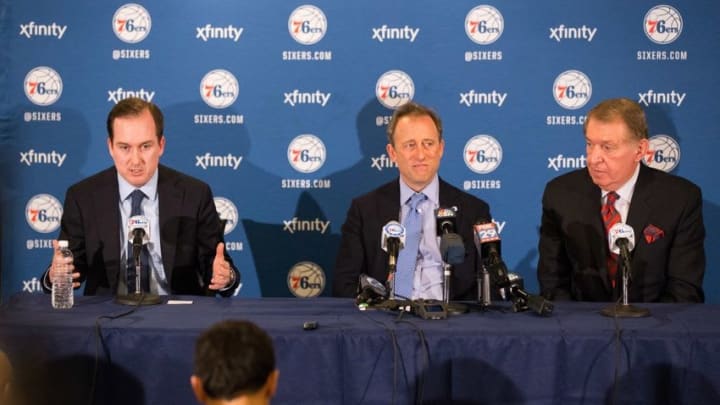
The Win Loss Paradox
The win loss focus is an unsolvable paradox. Here’s why:
Assume you are in the mindset of Wins and Losses. There is nothing wrong with that. It’s a free nation, and you have the right to choose. But if the goal is wins and losses, you build a team to win now. If you have the choice to draft a huge upside but with risk Joel Embiid with the third pick of the 2014 NBA draft, or another player with less upside but healthy, you choose health. If you have the chance to trade Elfrid Payton for the rights to Dario Saric and the opportunity to extinguish owing a first round protected pick for the Andrew Bynum nightmare trade, you don’t take that trade. In essence, winning now is a higher priority than the NBA draft picks.
In fact, if you are in the “win now” camp, your NBA draft board this year is a single first round pick. You never trade Michael Carter Williams, and therefore never get the Lost Angeles Lakers first round protected pick. The same Sixers never trade Thaddeus Young, and thereby fail to obtain the Miami Heat first round protected pick. The team would not absorb the contract of JaVale McGee from the Denver Nuggets, and therefore would not obtain the rights to the Oklahoma City Thunder’s first round protected pick. You don’t take on the contracts of Jason Thompson, Carl Landry, and Nik Stauskas from the Sacramento Kings for rights to swap first round picks for the next two seasons, plus the first round pick of the Kings in 2019.
In fact, without Sam Hinkie’s payroll slashing, signing developmental talent on this team, you don’t have the like of Covington, Holmes, McConnell, Canaan or Wood on this roster. You don’t draft Jahlil Okafor in the 2015 NBA draft. If you were focused on wins only, you would be in the ball park of the Sacramento Kings – whose head coach George Karl has been one of the most critical coaches of Sam Hinkie and the process of building a championship. If George Karl‘s take on the NBA is correct, the Kings should be heading deep into the playoffs. Instead, they are finishing another season out of the playoffs.
When I joined the Sixer Sense, my professional skepticism got the better of me. Here was a team that believed in the general manager despite losing. And so, I had to investigate. Without relying on wins and losses, just how good was the impact of Sam Hinkie on the Philadelphia 76ers team? I investigated the purest area of Hinkie’s influence, player transactions with other NBA teams. I reviewed the Jrue Holiday trade, the Spencer Hawes trade, the Thaddeus Young trade, the controversial Michael Carter-Williams trade, and finally, the K.J. McDaniels trade. In each occasion, there was no head scratching (albeit plenty of that happened at the moments of some trades). After the trades, events have shown time and time again that the moves were logical, the Sixers eventually ended up in a better position going forward (holistically) and that the organization was laying a foundation of a multi-year plan to improve to a championship caliber team. How could Sam Hinkie beat the odds, which if both teams are equal and GMs have similar goals, should have resulted in some deals going the wrong way for the team?
Next: True Proof In The Process
